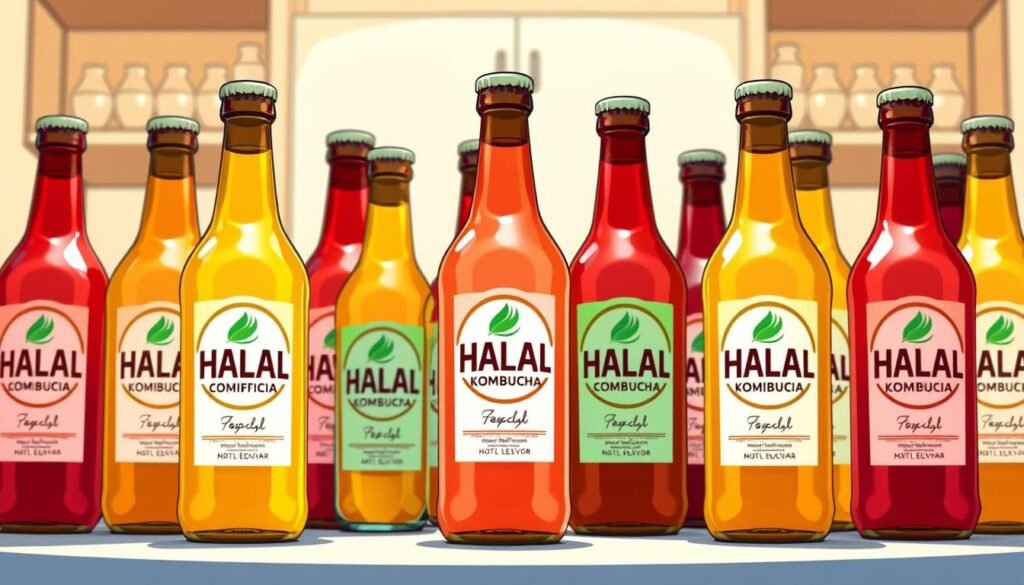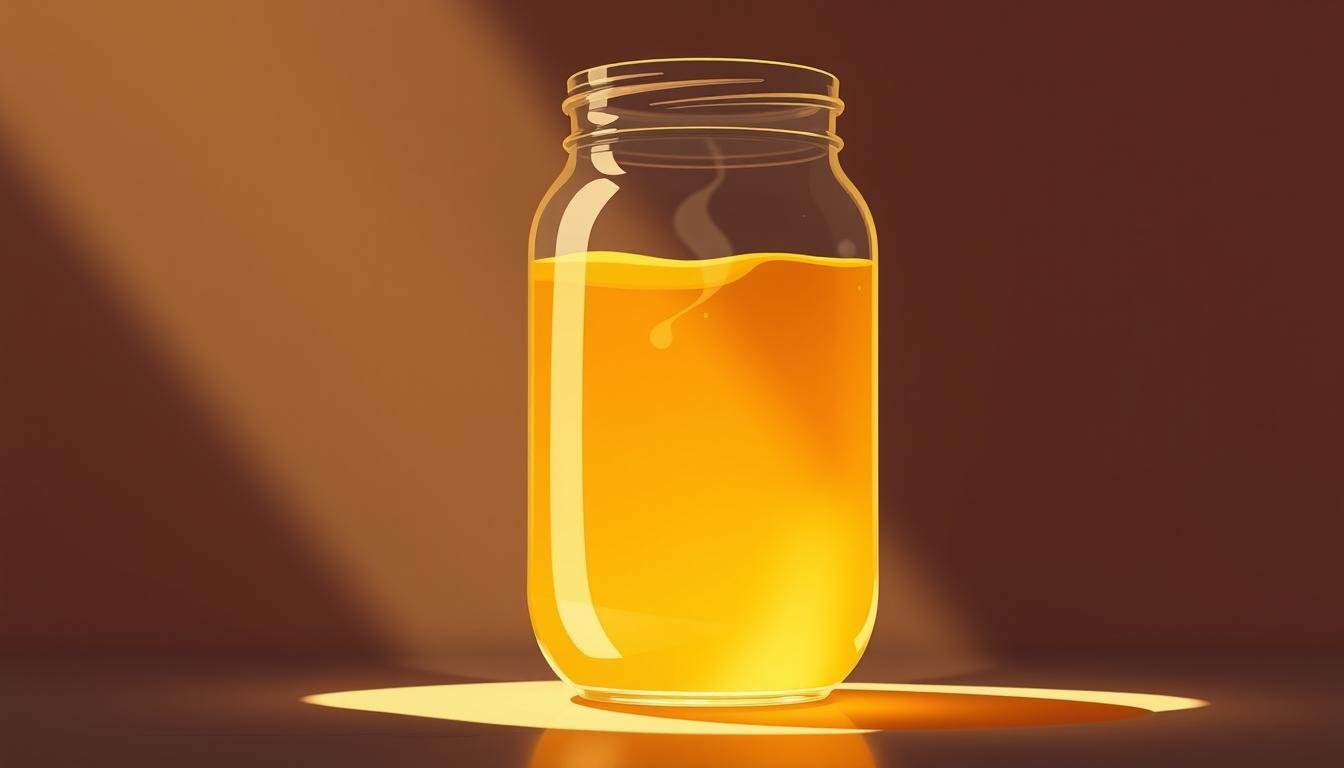While shopping last week, I saw many drinks on a shelf. I wondered, can Muslims drink kombucha? It made me think about health and faith together.
For Muslims, the big question is about alcohol in kombucha. Brands like RISE Kombucha have less than 0.5% alcohol. But homemade kombucha can have more, making it not halal.
Kombucha is getting more popular, and Muslims have questions. This article looks at science and the Quran. We’ll see if kombucha is okay for Muslims or if there’s a better choice.
What is Kombucha: Understanding the Popular Fermented Tea
Fermented tea like kombucha is now a hit for health reasons. It’s made from sweet tea and a special SCOBY culture. It’s a mix of old traditions and new health trends.
It’s found in places like Walmart and Costco. Its journey from Chinese apothecaries to American stores is fascinating.
Origins and History of Kombucha
Kombucha started in Northeast Asia over 2,000 years ago. It was loved by monks and healers for its health benefits. It spread to Russia and Europe through trade.
Now, it’s back in style worldwide. People are turning to natural fermentation again.
Common Ingredients in Traditional Kombucha
Kombucha needs kombucha ingredients like tea, sugar, and a SCOBY. You can add ginger or fruit for different tastes. But the SCOBY is key for fermentation.
Sugar feeds the SCOBY. It turns into ethanol and acetic acid during brewing.
Health Claims and Benefits Associated with Kombucha
Many say kombucha is good for you. They talk about probiotics, antioxidants, and detox benefits. But some claims, like boosting the immune system, need more proof.
This debate shows the mix of tradition and science in wellness.
Islamic Dietary Laws: The Foundation of Halal and Haram
Islamic dietary laws guide Muslim food choices. Halal means okay, and haram foods are not allowed. These rules come from the Quran and the Prophet Muhammad’s teachings.
They focus on health and being moral. The Quran says, “Eat of the good things We have provided for you” (2:172). This shows the importance of eating pure and in moderation.
“Allah does not burden a soul beyond that it can bear.” — Quran 2:286
Islamic rules say some foods are haram. These include amphibians, blood, carnivores, carrion, and intoxicants. Alcohol is also haram, even a little bit.
Things like lecithin, which might be from plants or animals, need careful checking. If it’s not clear, Muslims choose to avoid it to stay pure.
Certification is important too. Halal products must be free from contamination and use meat that was properly killed. Even things like gelatin need to be checked. Is it from plants or animals? Ask yourself if it fits with Islamic values.
Certifications like the MUI or IFANCA logos can help. They make it easier to know if a product is halal.
Knowing these rules helps make better choices. Most foods are okay to eat, but being careful is key. Let’s see how these rules apply to kombucha next.
The Critical Issue: Alcohol Content in Kombucha
Kombucha’s alcohol content is at the center of a halal debate. The kombucha fermentation process makes a small amount of ethanol. This is because the SCOBY breaks down sugar.
The Fermentation Process Explained
The SCOBY turns sugars into acetic acid and ethanol. Most commercial kombucha stops fermentation early. This keeps the alcohol below 0.5% ABV.
A 7-day fermentation makes 0.5% ABV. But 21 days can lower it to 0.32%. Longer brewing or warmer temperatures might increase it. Yet, most brands stay under 1.5%.
Typical Alcohol Percentage in Commercial Kombucha
Brands like Health-Ade are questioned for alcohol over 0.5% ABV. The FDA and many countries say kombucha is non-alcoholic if it’s under 0.5%. This matches Malaysia’s BFT brand, certified by JAKIM.
Most kombucha brands, like GT’s, have 0.2–0.5% ABV. But unregulated batches or home brews can have up to 2.5%. This raises halal doubts.
Comparing Kombucha’s Alcohol Content to Islamic Thresholds
Islamic law bans intoxication, not small amounts of alcohol. The hadith says, “Whatever intoxicates in large amounts is haram even in small amounts.”
Most scholars say it’s okay to drink alcohol in kombucha if it’s below intoxication levels. At 0.5%, kombucha’s alcohol is very small. This is why JAKIM and global halal rules allow it.
Can Muslims Drink Kombucha? Analyzing Different Perspectives
Islamic rules on kombucha depend on its alcohol content and how it’s made. Some say it’s banned, while others see exceptions. This part looks at how different views affect what Muslims choose to drink.

Conservative Islamic Views on Kombucha
Traditional scholars say drinking alcohol is forbidden, no matter how little. They believe even a tiny bit of ethanol is against the rules. They point to Quranic verses like 2:219, which talks about the badness of intoxicants.
They say that any ethanol, even 0.055%, makes kombucha not halal.
Moderate Islamic Interpretations
Moderate scholars think about the idea of istihlāl. They say that small amounts of alcohol are removed during fermentation. The Indonesian Ulema Council (MUI) says kombucha with less than 0.5% alcohol is okay.
They say that a little ethanol is made inert by processing. This makes it okay to drink. These views mix old traditions with new science.
Contemporary Scholars’ Opinions
New fatwas on kombucha show changing views among scholars. In 2022, Egypt’s Al-Azhar University said kombucha is fine if it has very little alcohol. Scholars like Dr. Tariq Ramadan think kombucha fits with Islamic food rules if made right.
These opinions show Islamic law can adapt to new things. But, the debate is ongoing. How do these rules affect what Muslims drink every day? Reading about these topics is key for making good choices.
Commercial vs. Homemade Kombucha: Different Halal Considerations
I’ve seen debates about homemade kombucha halal status. They focus on how it’s made. Brands like Remedy Kombucha are certified by Al-Iman Islamic Society. They pasteurize to keep alcohol under 0.5% ABV, which is okay for Muslims.
But, kombucha brewing at home can be risky. It might have more alcohol than allowed. We need to talk about these differences to help people make good choices.
Studies found homemade kombucha can have 3–5% ABV. This is like low-alcohol beer and is not allowed. The Prophet (peace be upon him) said:
If a person consumes alcohol, Allah will not accept their prayers for 40 days.
This shows we should avoid even a little bit of alcohol.
Commercial makers stop fermentation early and carefully. But, homebrewers face challenges. Things like temperature changes or longer brewing times can make too much alcohol. Testing kits can help, but most people don’t have lab tools.
This makes it hard to know if homemade kombucha is safe. Choosing store-bought kombucha for Muslims is safer. Brands like Remedy are certified to be halal.
For those brewing at home, shortening fermentation and using hydrometers can help. But, without certification, it’s not sure if it’s okay.
At the end, Muslims should choose carefully. Commercial kombucha is clear and safe. But homemade kombucha brewing needs careful control. What steps will you take to make sure your drink is right for your faith?
Certification Matters: Finding Halal-Certified Kombucha Brands
Looking for kombucha that’s halal is easier now. The halal certification process checks if ingredients and how it’s made meet Islamic rules. This makes it simpler to find drinks that fit with your faith.

Getting halal certified is strict. For kombucha, it means the drink can’t have more than 0.5% alcohol. Brands like Remedy Kombucha and CHACHA Kombucha follow these rules. Even Rise Kombucha in the U.S. gets certified by Islamic Services of America (ISA).
“Halal certification bridges cultural gaps by ensuring transparency,” says the ISA. “It removes guesswork for conscious consumers.”
So, where can you buy halal kombucha? Look for it at places like Whole Foods or online at Amazon. Always check the label for the certification logo. Jun tea and sparkling herbal teas are also good options, as they don’t need fermentation.
Choosing halal-certified kombucha is about trust. It’s not just about the product, but also the process that checks it. For those who want to follow their faith, this certification is very important.
The Science Behind Kombucha Fermentation and Islamic Rulings
The mix of ethanol in kombucha and Islamic rules depends on knowing its science. The kombucha fermentation process is key. It turns tea sugars into acetic acid, making a little ethanol.
This is different from wine or beer, which aim for more alcohol. Kombucha’s process makes ethanol very small, often less than 0.5% ABV. Brands like OMBucha® usually have even less.
ethanol production in fermented beverages the>kombucha fermentation has two parts. First, yeast makes ethanol from sugar. Then, bacteria turn ethanol into acetic acid. This is unlike drinks meant to be alcoholic, where fermentation stops early.
So, kombucha usually has 0.3–0.5% ethanol, which is not enough to get drunk. A 2023 study in the Journal of Food Science found that fermentation over 10 days might increase ethanol. But most brands keep it under 1%.
scientific analysis of kombucha composition recent>scientific studies show kombucha has a bit of ethanol, like ripe bananas or sourdough bread. Scholars use the idea of istihalah here. When something like ethanol changes chemically and can’t go back, it’s okay.
A 2015 fatwa at kombuchawow.com says that ethanol in kombucha under 0.5% is okay.
Store-bought kombucha is pasteurized, stopping fermentation and keeping alcohol low. But homebrewers might get higher ABV if they ferment too long. Brands like OMBucha® follow this science to meet Islamic legal standards.
The science and tradition agree: a little ethanol from natural fermentation is fine. This lets Muslims make good choices in their diet.
Alternative Beverages for Health-Conscious Muslims
Many Muslims look for drinks that are healthy and follow Islamic rules. With Kombucha’s halal status in question, halal-certified brands are becoming more popular. They offer choices like halal probiotic drinks and traditional Islamic drinks.
These drinks mix old traditions with new health trends. They make sure Muslims don’t have to choose between their faith and health.
Non-Fermented Probiotic Drinks
Some Muslims prefer drinks that aren’t fermented. Options like pasteurized probiotic waters or coconut water are good choices. They are healthy for your gut but don’t have alcohol.
Brands like Thomson & Scott’s Sparkling Chardonnay and Smashed British’s non-alcoholic ciders are good examples. They use natural ingredients and are certified halal. This makes them clear choices in a complex market.
Traditional Islamic Beverages
Traditional Islamic drinks like jallab and herbal teas have been around for a long time. Jallab is sweet and made from dates. Herbal teas like sage and mint are also popular.
Talbinah, a barley-based soup, is mentioned in hadith (Sahih al-Bukhari 5881). It helps with digestion and connects us to our roots. Modern drinks like amazake, a Japanese rice-based probiotic, also fit into these traditions. They show that health and heritage can go hand in hand.
FAQ
Is kombucha halal for Muslims?
What are the main ingredients in kombucha?
Does kombucha provide health benefits?
What does halal and haram mean in Islamic dietary laws?
How much alcohol is typically found in commercial kombucha?
Do all scholars agree on the permissibility of kombucha?
Why is there a distinction between commercial and homemade kombucha?
How can I identify halal-certified kombucha?
What alternative beverages can Muslims choose instead of kombucha?

Embracing Faith, One Insight at a Time!
The teachings of the Quran have always guided my path. With a deep passion for Islamic knowledge, I strive to blend the wisdom of tradition with the relevance of today, making the timeless messages of Islam accessible and meaningful for everyone.
Muslim Culture Hub is my platform to share historical insights and thought-provoking articles, exploring both well-known and lesser-discussed aspects of Islamic culture and beliefs. My mission is to create an inclusive online space where everyone can learn, strengthen their faith, and connect with the profound message of Islam.
Join the journey!
May peace be upon you.








